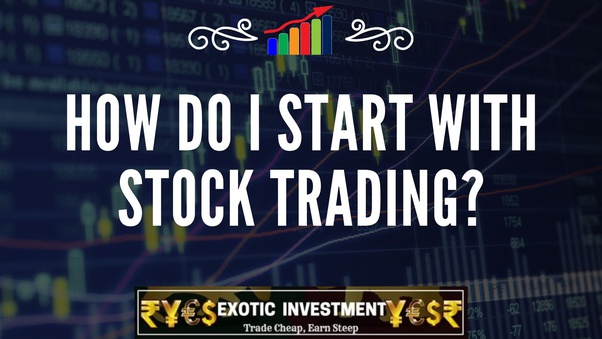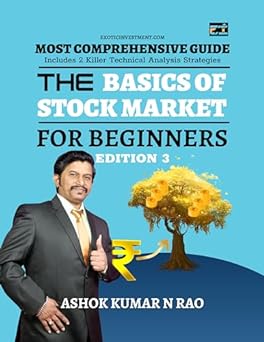How do I start stock trading is a Common Question for Beginners in the Stock Markets! Love to be of any help for this genre.
How do I start trading stocks?
To start trading in the share market or the stock market in India, you need a Demat and trading account. Demat and trading accounts in India are provided by the two depositories, NSDL and CDSL, through brokerage firms, also known as stockbrokers or sharebrokers.
So you need to have a Demat account – to open an account for the trading purpose you need to submit your PAN card, Offline KYC/Aadhaar Card, Aadhaar linked mobile, and signed canceled name printed cheque leaf ready.
What is the stock exchange?
Stock Exchange is a type of exchange that allows traders to buy and sell shares, just as companies can issue shares.
Shares represent the equity of the company, while the shares of the company.
The exchange serves two main purposes.
- First, providing capital to the company so that it can use these funds to develop its business.
- The second objective, which serves the stock market, is to offer investors the opportunity to share the profits of the listed company.
Take the culmination of various online finance courses according to your needs and interests.
1) Here are types of stocks that every savvy investor should own for a balanced hand.
1.Growth stocks. These are the shares you buy for capital growth, rather than dividends.
2. Dividend stocks.
3. New issues.
4. Defensive stocks.
2) What should I Learn before Trading Stocks?
1. Acquaint Yourself With the Stock Market.
2. Establish Your Purpose For Trading.
3. Consider Your Finances.
4. Find a Broker and Trading Platform.
5. Practice Before Depositing Money.
6. You must have executed at least 100 prior trades for any product type (Stock, Options, Bonds, Mutual Funds, and so on). To trade any product, you must have a Good or Extensive Knowledge Level of that product. To trade options you must have a minimum of two years of trading experience with that product.
3) Why should you learn about stock trading before putting your hard-earned money!
Here are some factors that affect the hustle and bustle of Dalal Street.
Interest rates. A variation in interest rates causes a flurry of movement in the stock markets. …
Inflation. Inflation is a surge in the pricing of goods and services over a period of time. …
1. Global Markets.
2. Supply and Demand.
3. Risks of stocks
Returns are not guaranteed – While stocks have historically performed well over the long term, there’s no guarantee you’ll make money on a stock at any given point in time.
You may lose money – Stock prices can change often and for many reasons.
Indian stock markets fell sharply, dragged down by financial stocks after a prominent fund house said it would wind up some funds. The Sensex closed down over 500 points at 31,327, closing the week about 1% lower while Nifty ended 1.71% lower at 9,154. Shares in HDFC Asset Management Co slid over 6%.
So, as the inverse, the key way to lose money in the stock market is to buy high and sell low. You can lose money this way with every type of investment known: stocks, bonds, mutual funds, ETFs, options, futures, even art, and collectibles. This is the most basic way that you can lose money in the stock market.
4) What is mandatory to learn before starting to trade stocks
1. Avoid the herd mentality
2. Take an informed decision
3. Invest in business you understand
4. Don’t try to time the market
5. Follow a disciplined investment approach
6. Do not let emotions cloud your judgment
7. Create a broad portfolio
8. Have realistic expectations
9. Invest only your surplus funds
10. Monitor rigorously
11. Trade with the amount you can afford to lose
12. Perform proper research
13. Use a Stop Loss
14. Avoid overtrading
15. Trade with Liquid share
16. Use Strict Stop-loss order
5) Why 95% of the traders lose money?
Traders lose money because they try to hold the option too close to expiry. … Hence if you are getting a good price, it is better to exit at a profit when there is still time value left in the option. Quite often traders lose money on long options as they hold the option ahead of key events
Options are risky if you don’t understand how to use them, but by themselves, options are not risky, although some strategies are risky. In other words, you can design option strategies from conservative to risky, and in many cases, they are less risky than trading stocks.
6) Why is stock trading so lucrative?
Stock trading is profitable if you can do with the proper research and knowledge. It is difficult too but it is not impossible. The best strategy for trading is “Earn by Learn”. If you will trade in a proper way with research and analysis you can generate good returns in the short and long term.
Some day traders do make money. Day traders typically try to make money by buying stock, options, futures, commodities, or currencies, while holding positions for short periods of time— anywhere from a few minutes to a few hours—before selling them again. Day traders can also use leverage to amplify best returns quickly.
7) How soon can you make money trading stocks?
In most cases, profits should be taken when a stock rises 20% to 25% past a proper buy point. Then there are times to hold out longer, like when a stock jumps more than 20% from a breakout point in three weeks or less. These fast movers should be held for at least eight weeks.
In Stock trading, you can make money from trading stocks. Many day traders make huge money. However, do not worry about the odds, well-planned action definitely gives the good results study says about 13% of day traders achieve a profit.
8) Is day trading better or delivery trading better as a beginner? What is intraday trading?
When you’re shopping for and selling of shares in the equal trading day, you’re indulging in intraday trading. On this course of action, stocks are purchased with the intention of earning and no longer with any objective of investment.
That is performed by using harnessing the motion of inventory indices, this means that that the various prices of the stocks are harnessed as a way to earn earnings from buying and selling of shares. To participate in intraday trading, a web buying and selling account must be installed with unique orders which are explicit to intraday buying and selling. Those orders are squared off earlier than the buying and selling day ends.
Only a bit of capital funding is needed by means of the dealer as payments can be made in small margins. The investor can leverage capital to earn the most profits. It eliminates the dangers of the stocks. Hazards of intraday trading.
there are no long-term capital investments. Using leverage can result in more losses. It requires consistent attention of the dealer.
9) What’s delivery buying and selling?
Delivery trading is one of the maximum commonplace trading techniques inside the stock market. In contrast to intraday buying and selling, shipping buying and selling involve an extra reported purpose of an investment than just trading opportunities. This is due to the fact the buyers have it in thoughts to maintain directly to their stockholdings for an extended period of time. In this procedure, there aren’t any time constraints in the selling of shares. As long as the shares are delivered to the related Demat accounts, it is taken into consideration as a delivery change. You cannot carry out shipping trades without a Demat account – considering the fact that a Demat account is in which your stocks will be saved.
there may be no time limit to sell stocks. It affords easy bonus profits as to dividend, bonus issues, rights problems, and so on, with the inventory owner earning all the bonuses which the agency doles out. It helps in considerably increasing the earnings of the investor as higher returns are supplied to the owner through the agency’s dividends and bonuses. There is no hazard of short selling. Brief selling is the technique of borrowing shares to promote within the market, and then shopping for it back once earlier than the give up of the buying and selling day.
10) Dangers of intraday buying and selling
Complete prematurely bills: No trading can take place if the investor can not pay the entire amount of transaction up the front. Thus, an investor can become losing an awesome opportunity because of the loss of funds. Intraday buying and selling v/s delivery buying and selling.
It is straightforward to conclude that day trading is normally finished within an afternoon. This normally way that all the shares purchased within the day needs to be sold with the aid of the quit of the day, before the final of the markets. If these stocks aren’t sold, they’re mechanically squared off on the closing time.
But, then again, in delivery based totally buying and selling, shares bought can be maintained for an extended length for higher income returns. While intraday trading offers the opportunity for low capital money owed and margin payments, transport buying and selling calls for complete quantities for its transactions. As an intraday trader, if one can decide and forecast the value of stocks at brief and small periods, then intraday buying and selling is a good idea. Despite the fact that there is much technical gear that assists in predicting short term charge moves. However, if one thinks long term investing is higher acceptable for them, and they are capable of select shares based totally on the agency’s intrinsic cost and relatable checks (together with the business enterprise’s essential indicators – like price-to-profits ratio, ebook price, and so on), transport primarily based buying and selling may be taken into consideration as a higher alternative.
11) Should I trade in stocks with margin or should I trade only with the amount I’ve in the account?
The rules require you to have at least 25 percent of the total market value of the securities in your margin account at all times
The biggest risk from buying on margin is that you can lose much more money than you initially invested. A loss of 50 percent or more from stocks bought on margin equates to a loss of 100 percent or more, plus interest and commissions.
In that scenario, you lose all of your own money, plus interest and commissions
If you buy a stock on Monday and sell on Tuesday, those funds won’t settle until Friday.
One major plus side to cash accounts is you can day trade all you want as long as you have settled funds and won’t be held to the pattern day trading rules in a margin account.
Conclusion: This is not the end of the Beginning of How to do Stock Trading. Learn well before starting to trade.
Don’t rush to make money as this will get in the way of losing money!

